Dal campo alla tua tavola
Nessun meglio di noi da 30 anni porta direttamente sulla tua tavola noci Lara prodotte nel rispetto della Natura.
UN solo obiettivo. rispettare la terra e la natura
Produzione integrata.

La produzione integrata è un metodo di produzione a basso impatto ambientale, in quanto prevede l’uso coordinato e razionale di tutti i fattori della produzione allo scopo di ridurre al minimo il ricorso a mezzi tecnici che hanno un impatto sull’ambiente o sulla salute dei consumatori, soprattutto attraverso il massimo sfruttamento delle risorse naturali e il ricorso a mezzi tecnici tradizionali solo come ultima scelta. In merito alle tecniche disponibili, a parità di condizioni, la scelta ricade prioritariamente su quelle di minore impatto e, in ogni modo, esclude quelle di elevato impatto.
Gli ambiti di applicazione principali dell’agricoltura integrata sono principalmente quattro:
• Fertilizzazione;
• Lavorazioni del terreno
• Controllo delle infestanti
• Difesa dei vegetali
Come otteniamo una noce perfetta!
Raccogliamo le noci
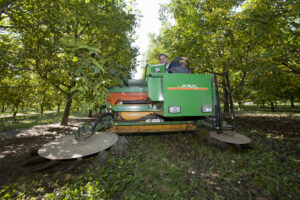
La produzione delle noci segue un processo preciso per poter trarre dal frutto la massima qualità seguendo le regole del disciplinare.
La maturazione delle noci si conclude in genere all’inizio del mese di settembre, ed è subito dopo questo periodo che avviene la raccolta.
Ogni azienda effettua la raccolta in massimo 20 25 giorni: vengono effettuati i primi due passaggi tra i filari delle piante per raccogliere i frutti che sono già caduti attraverso quel processo conosciuto come andanatura per cui le noci vengono radunate meccanicamente in un’andana centrale e poi raccolte tramite aspirazione.
Lavaggio con acqua
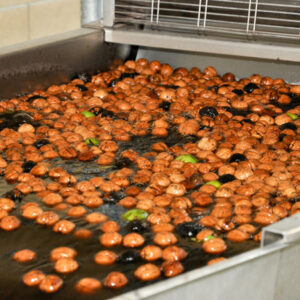
Una volta raccolte le noci vengono avviate al centro di raccolta di Chiarano.
La lavorazione si avvia con una pre-pulitura effettuata per eliminare sia le noci che non rispondono alla qualità richiesta sia tutti quegli elementi (foglie, terra, piccoli rami, erba, sassi ecc.) che, a seguito della raccolta, possono essere rimasti assieme al prodotto.
Si procede poi al lavaggio usando esclusivamente acqua senza l’aggiunta di prodotti sbiancanti e additivi: la naturalità del prodotto è per il Noceto un requisito fondamentale.
Smallatura
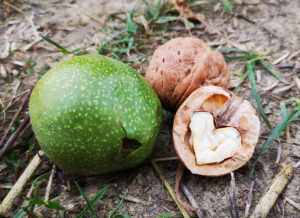
Dopo il lavaggio una selezionatrice ottica individua le noci con il mallo e le manda in una speciale macchina che si occupa di togliere il mallo dalla noce senza rovinarne il guscio.
Il mallo della noce è quello strato polposo che costituisce la porzione esterna del guscio della noce. Si tratta di una parte non commestibile del frutto, di colore verde ricca di tannino.
Nelle prime settimane della raccolta le noci sono spesso ancora ben attaccate al loro mallo, poi con il passare del tempo il guscio si separa dal mallo lasciando cadere la noce a terra.
Essicazione
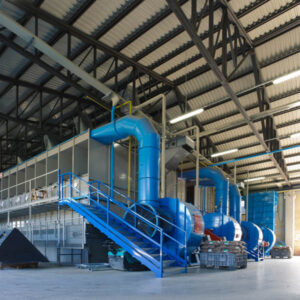
Una volta smallate, le noci subiscono un ulteriore lavaggio con spazzolatura e un accurato controllo qualità da parte degli addetti alla cernita manuale.
Una volta lavate, le noci subiscono un lento processo di essicazione a bassa temperatura che permette la stabilizzazione, del contenuto in acqua e il mantenimento delle caratteristiche organolettiche e della sua fragranza inconfondibile.
Selezione per qualità e calibro
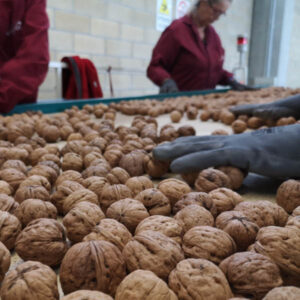
Le noci che vendiamo devono avere la minore quantità possibile di difetti interni ed esterni e avere un gheriglio ben sviluppato.
Per garantire la massima qualità possibile oltre ai due controlli qualità in entrata del prodotto a questo punto, dopo l’essicazione si effettuano altri due controlli qualitativi sul prodotto.
Pre-Selezione Manuale
Gli operatori procedono ad eliminare tutte le noci che presentino dei difetti esterni.
Selezione Automatica
Unica nel suo genere, e frutto di una collaborazione con una ditta leader nella costruzione di macchine per la selezione della frutta, Il Noceto è dotato di una selezionatrice ottica e di una calibratrice automatica che divide le noci per calibro. La macchina è inoltre in grado di individuare le noci non completamente sviluppate all’interno e tramite l’AI anche di individuare ed eliminare tutte le noci che presentino dei difetti sul guscio.
Controllo qualità e calibro
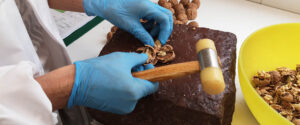
Una volta che la selezionatrice ha separato le noci vuote e semivuote e quelle con difetti esterni, un ulteriore controllo qualità serve ad individuare lotto per lotto la presenza dei difetti interni.
Questi controlli a campione vengono effettuati ogni 250 kg di prodotto essicato arrivando a seconda delle stagioni da 5 a 10.000 controlli all’anno.
Il controllo si effettua su un campione di noci rompendone una a una per verificare la presenza di difetti interni.
Solo così dopo ben 3 livelli di controllo con macchine automatiche e e 3 livelli di controllo con operatori si arriva allo standard di qualità che permette di mettere in vendita la famosa Noce d’Oro.

Prodotte con Amore nelle nostre Fattorie
Il Noceto è una cooperativa agricola, con finalità mutualistica, fondata nel 1993 che fin dall’inizio della sua attività ha individuato nella qualità delle sue produzioni lo strumento di affermazione nel mercato della frutta secca. Il Noceto è da sempre sinonimo di prodotti di qualità provenienti da territori agricoli riconosciuti per le loro caratteristiche di fertilità e naturalistiche.
Il cuore della cooperativa è un moderno centro di lavorazione delle noci, dotato di impianti d’avanguardia dove tutte le fasi di produzione sono sottoposte a rigorosi e continui controlli. Il lavaggio delle produzioni avviene esclusivamente con acqua in modo da mantenere inalterate tutte le caratteristiche naturali delle noci sia come gusto sia come colore e come qualità nutritive. Oltre a questo le produzioni sono selezionate e commercializzate rispettando vincoli più restrittivi rispetto all’attuale normativa.
La cooperativa vuole incrementare la superficie coltivata a noci dei propri soci e parallelamente aumentare il numero di soci che la compongono. Agli agricoltori viene chiesto di ottenere produzioni di altissimo profilo qualitativo, nella consapevolezza che la qualità del prodotto che poi verrà venduto, parte proprio dalle singole aziende agricole. I soci produttori, quindi, sono tutti coinvolti nell’utilizzo di tecniche di produzione integrata per ottenere una produzione di eccellenza rispettando la sostenibilità ambientale ed i requisiti Globalgap.
La cooperativa è impegnata a migliorare i rapporti, le comunicazioni e i controlli all’interno della filiera produttiva con specifiche riunioni tecniche e con la predisposizione di un proprio disciplinare di produzione che pone restrizioni nell’utilizzo di agrofarmaci e di fertilizzanti, disciplinare che tutti i soci si sono impegnati a rispettare. La cooperativa si impegna a comunicare all’OdC, entro 24 ore, eventuali reclami inerenti alla sicurezza alimentare o processi giudiziari in cui viene giudicato responsabile che possano mettere a repentaglio la reputazione e la credibilità dello standard GlobalGap.
Con l’applicazione di tale disciplinare a tutti i livelli della filiera, la cooperativa riesce a commercializzare un prodotto che può fregiarsi della certificazione “zero residui”. *Abbattimento dei residui di prodotti fitosanitari del 70 % dei limiti previsti dall’attuale normativa, considerando assenza anche eventuali residui inferiori a 0,01 mg/Kg.
La passione che i collaboratori dimostrano nel proprio lavoro spinge la cooperativa a incoraggiare gli apporti personali in modo che tutti si sentano coinvolti nel programma di sviluppo aziendale e nel processo di miglioramento continuo dell’organizzazione della società.

Il Presidente
G.G.S. Bonaldi
I nostri alleati
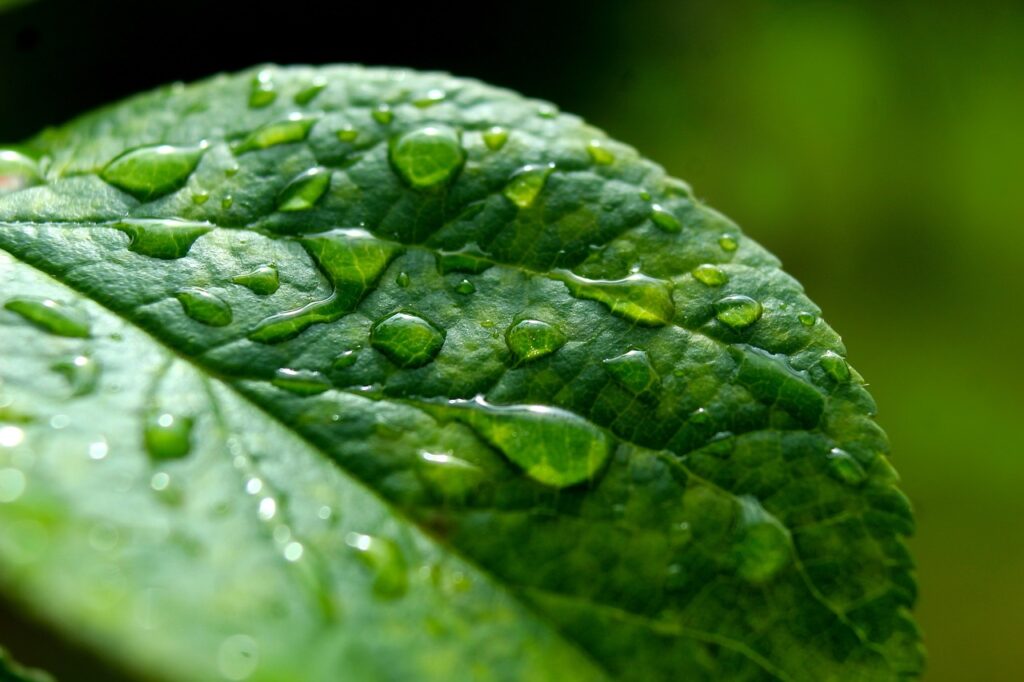
ACQUA
Senza acqua le piante non riescono a portare a completa maturazione i frutti.
Se vuoi sapere di più, scrivici!
Siamo a tua disposizione per ogni dubbio o domanda.

